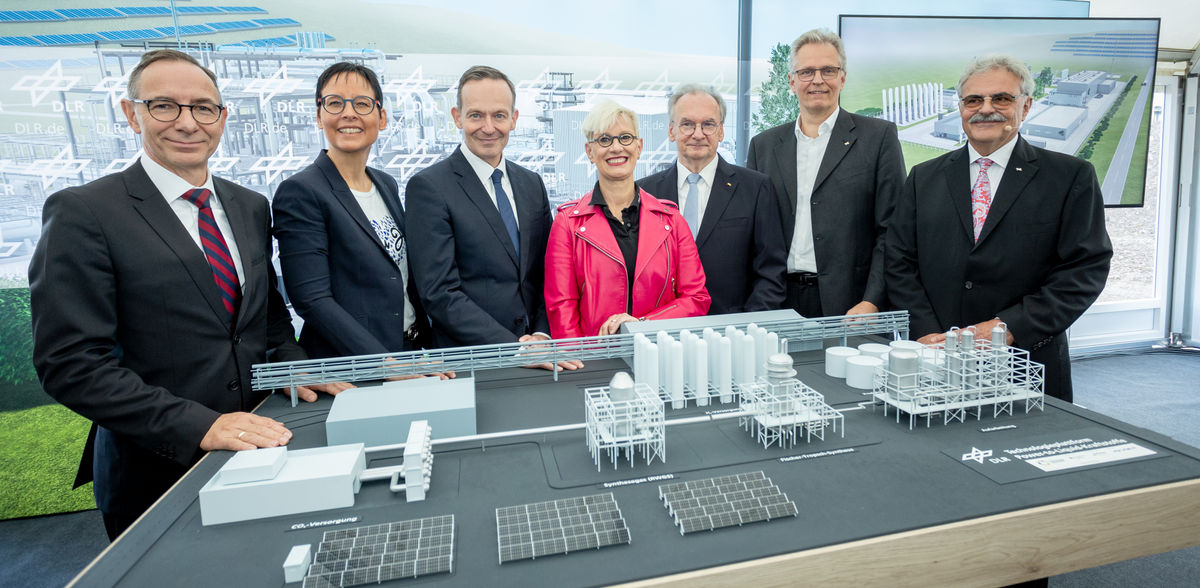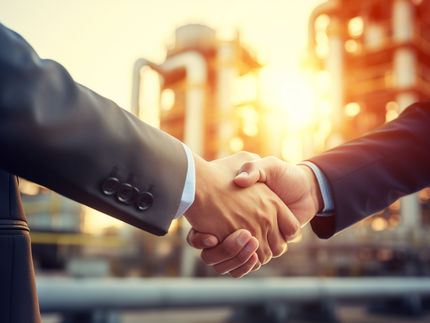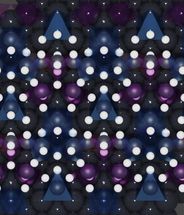E-fuels for climate-compatible aviation
Construction begins on Technology Platform for Power-to-Liquid Fuels (TPP)
The German Aerospace Centre (Deutsches Zentrum für Luft- und Raumfahrt; DLR) is currently building the world's largest research facility for the production of electricity-based fuels, also known as electrofuels or e-fuels. The Technology Platform for Power-to-Liquid Fuels, or TPP for short, in Leuna, Saxony-Anhalt, will optimise e-fuels and further develop technologies and processes for their production on an industrial scale. The official start of construction was marked by an event at the Leuna chemical site on 1 October 2024, attended by Federal Minister for Digital and Transport Affairs, Volker Wissing, and Minister-President of Saxony-Anhalt, Reiner Haseloff. Germany's Federal Ministry for Digital and Transport Affairs (BMDV) has provided approximately €130 million in funding for the construction of the facility and additional funding is planned for research operations, due to commence in 2028.
"The TPP is a globally unique research facility for e-fuels," said Anke Kaysser-Pyzalla, Chair of the DLR Executive Board. "As such, it will be a magnet for high-calibre research and industrial enterprises. At the same time, DLR is putting Leuna on the map for pioneering projects that bear the 'made in Germany' seal of quality. By undertaking this major project, DLR's research is making an important contribution to profound transformation in the energy, mobility and industrial sectors, and to Germany as a hub for technology. After all, low-carbon, climate-compatible fuels will help secure the global mobility of the future."
"DLR is doing pioneering work in Leuna," said Volker Wissing, Federal Minister for Digital and Transport Affairs. "The Technology Platform will be the world's first facility testing e-fuels in a fully integrated way across the entire technology chain and on a semi-industrial scale. It provides the crucial step between research and industrial production, and the knowledge gained here will help us get closer to our climate targets. Decarbonising transport is a major challenge, but we are tackling it with courage and determination in Leuna. Politics, business and science must work hand in hand if we are to achieve our ambitious goals, and the BMDV is doing its part by providing €130 million in funding for the construction of this facility."
"The inauguration of a flagship project like the Technology Platform is a very encouraging sign for the region as a hub for the chemical industry," says Reiner Haseloff, Minister-President of Saxony-Anhalt. "Old industries may be disappearing, but new, forward-looking industries are being built in their place. This shows that the traditional industrial region is still innovative today, ready for change and primed for a successful future."
"By developing the TPP, DLR is pursuing a holistic approach and mapping the entire process chain for power-to-liquid fuels," says Meike Jipp, DLR Divisional Board Member for Energy and Transport. "This ranges from the raw materials to the production of e-fuels, all the way through to their certification and application. DLR's energy researchers can draw upon extensive expertise and long-standing experience in all these areas. The fuel produced in demonstration processes will be made available to research and pilot projects for testing in specific use cases."
"This facility is focused on the fuels of the future and, above all, on pioneering technologies and the necessary expertise that will make a key contribution towards further developing this region as a centre of excellence for future-proof fuels, raising Leuna's profile as a leading location for sustainable chemical manufacturing in Europe," said Christof Günther, Managing Director of InfraLeuna.
TPP will have the capacity to produce 2500 tonnes of e-fuels per year – production on a semi-industrial scale. Thanks to its modular design, the facility can be retrofitted with additional components and its capacity further increased, allowing for the integration of more research topics and investigations into alternative manufacturing and process steps.
Preparing technologies and processes for use in industry
With TPP, DLR is closing the gap between scientific research and the industrial production of power-to-liquid fuels. To do this, DLR scientists are working with experts from industry and research to develop, test and improve processes and procedures for the industrial-scale production of e-fuels. Scaling up technologies is a major challenge: after all, not everything that works on a smaller scale in the laboratory can simply be scaled up for industrial production. Researchers are putting the knowledge they have acquired to the test in demonstration operations with the TPP, producing e-fuels on a semi-industrial scale. DLR is also investigating how production can be economically optimised and costs reduced.
"Efficient and economically viable technologies, procedures and processes for the production of power-to-liquid fuels – as researched and developed by DLR at the TPP – are crucial for producing such fuels on an industrial scale," said Karsten Lemmer, DLR Executive Board Member for Innovation, Transfer and Research Infrastructure. "At the same time, they also represent a promising, forward-looking field of business for companies in the aviation, mobility and energy sectors, as well as in plant and process engineering – areas where German and European companies have traditionally held a strong position. As a practical large-scale research and demonstration facility, the TPP is a flagship project that accelerates the transfer of technology from research to industry, thus creating a competitive advantage for local companies."
Optimisation through custom fuel design
Electricity-based fuels have the potential not only to save large amounts of carbon dioxide (CO2), but also to significantly reduce 'non-CO2 effects'. These include the emission of nitrogen oxides, soot particles and water vapour. In aviation, non-CO2 effects can have a greater impact on the climate than CO2 released. For example, soot particles and water vapour in the atmosphere can create condensation trails, contrails, which have an additional warming effect. In this context, power-to-liquid fuels offer the advantage of 'fuel design' – their chemical composition can be optimised so that, for instance, no soot or particulate matter is produced during the combustion process.






























































